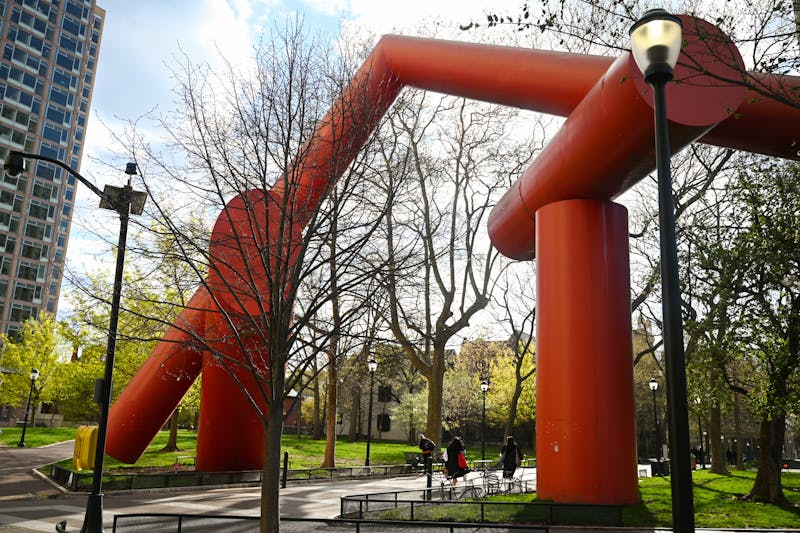On the surface, Clark Park, the largest public green space in University City, appears to be an urban oasis, with children playing, families picnicking and chess players staking their claim.
But a master plan designed to improve the park has ignited fierce debate over just who has the right to determine the park's future.
A group of local residents vehemently opposes the plan -- which has already been drafted and approved by the Friends of Clark Park -- and are attempting to have it thrown out altogether.
The plan "was basically railroaded through," said Darryl Stovall, whose home overlooks the park. "The plan was already established by the time that it was presented. It was not open to any discussion or enlightenment."
The process to map the park's future began last year when a coalition of the Friends of Clark Park, the University City District and the city's Department of Recreation decided to seek grant money to hire a landscape architect to prepare the master plan. As part of this process, a series of public meetings were held to solicit community input.
From these meetings, a series of draft plans was prepared. But just the notion of changing the texture of the beloved 106-year old park has ruffled many feathers.
"There's a point of view held by quite a few people in this neighborhood that we didn't want this park redesigned," area resident John Parrott said. "We wanted conservation and maintenance... rather than redesigning it."
Preservation does figure into the plan in the form of new lighting, new benches and trash cans and the replacement of many sections of sidewalk. But the relocation of the toddler playground, as well as the enlargement of the basketball courts and the plan's suggestion of a public restroom, have all drawn the ire of some residents.
Opponents of the plan feel the relocation of the playground to a lot adjacent to a play area for older children will result in bullying. They are disturbed by the fact that enlarged basketball court will eat up green space and have concerns about restroom maintenance and security.
But it is the issue of trees -- the lifeblood of the park -- that has evoked the most heated discussion between parties.
"If anything has come out of the community, it's that they really want to keep things green," said Friends of Clark Park board member Mathew Grubel, an area resident.
To that end, a detailed horticultural study of the park's 306 trees was just completed. But Conrad Hamerman, a local resident and former University of Delaware landscape architecture professor, said that the tree survey should have been done before the layout of sidewalks and the placement of facilities was planned.
But another landscape architect, University City District head Eric Goldstein, says that the procedure is "giving the community exactly what was promised."
"It's a logical step to do a spatial arrangement and then to start studying all of the elements that make up the plan," Goldstein said.
Some of those currently opposed to the plan say that they have been pressing their points throughout the public comment process. They feel that reopening the plan is needed, despite the investment of significant time and resources.
"If you have a jury in design school and the students present a project, you don't ask them if they've worked like crazy for six weeks -- you judge the ultimate result," Hamerman said.
But Friends of Clark Park Vice President Anne Kringel countered that there is no more time -- or money -- to revisit the planning process.
"I'll tell you that this plan is a consensus of our community, and for a few people to bring it down would be tragic because this is our opportunity to move the park forward," said Kringel, a Penn Law School professor.
Although the plan has been endorsed by the Spruce Hill Community Association and Congressman Chaka Fattah, a petition with about 140 signatures has been delivered to City Councilwoman Jannie Blackwell, asking her not to support the plan. Blackwell has not yet taken a position on the plan and could not be reached for comment yesterday.
A motion to rescind the Friends of Clark Park approval of the plan was introduced -- and tabled -- at a Monday night meeting. Opponents of the plan have also targeted funders who may donate money to implement the plan.
"The reality is that the [possible funder] Pew [Charitable Trusts] likes to give money to people and have everybody love them," local Republican ward leader Matthew Wolfe said. "They're going to be reluctant to give money in a situation where people are going to be mad at them."
A $55,000 grant from the William Penn Foundation was used to produce the master plan. Mark Eyerly, the Foundation's spokesman, would not comment on how future funding might be affected by a divided community, but he said that the Foundation was "very confident of the process that is being followed to put this plan together."
"It would be impossible in the fifth largest city in America in one of its most used parks to find unanimity of how that park is supposed to be used," Eyerly said. "That's an impossible goal."
Bringing all the competing groups to the table is the first order of business for newly elected Friends of Clark Park President Susan Scanlon.
"The real challenge is not to write these people off, but to work wi th them," Scanlon said. "I am confident that some plan for the park will go through."
The Daily Pennsylvanian is an independent, student-run newspaper. Please consider making a donation to support the coverage that shapes the University. Your generosity ensures a future of strong journalism at Penn.
DonatePlease note All comments are eligible for publication in The Daily Pennsylvanian.








